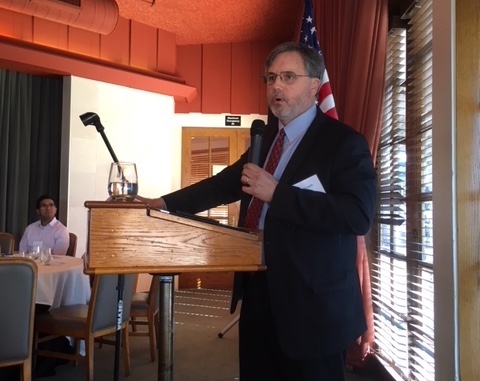PMSA’S McLaurin says California Ports and Air Quality Agencies Must Help the Maritime Industry Achieve Zero Emission Goals
John McLaurin, president of the Pacific Merchant Shipping Association (PMSA), said the Ports of Los Angeles and Long Beach as well as California air quality regulatory agencies need to rethink mandating zero emissions goals for terminals and trucking companies.
The ports and regulatory agencies must work together with maritime industry operators to help fund new zero emission cargo-handling equipment and trucks.
He also said processing environmental impact reports must be speeded up if zero emission investments are to be completed on time.
PMSA has offices in California and Washington state. It represents owners and operators of marine terminals and U.S. and foreign vessels operating throughout the world.
McLaurin, who spoke to the Propeller Club of Northern California at Oakland on February 6th, said the two Southern California ports’ new Clean Air Action Plan is designed to reduce terminal operation emissions to zero by 2030.
The ports have already achieved major reductions in diesel particulate matter. The necessary upgrades to achieve zero emissions “could cost $14 billion” and “the technology does not exist” to implement this ambitious goal.
McLaurin worries that the “glacial speed at which environmental impact reports in California get processed” might take years before terminals can even begin construction of zero emission cargo-handling operations.
Terminals “will need to be ripped up” to install automated and zero emission technology requiring major rebuilding.
Delays and higher costs will undermine competitiveness of California marine terminal operators and cause some shipping lines to relocate their business to U.S. Atlantic and Gulf coast ports.

In contrast, the Port of Oakland is on track to achieve its lower emission goals and is dramatically reducing emissions without the same potential disruptions that will occur making the Los Angeles and Long Beach proposals a reality.
McLaurin noted that California regulators are mandating that all ships including tankers, bulk carriers and container ships arriving at California ports will be required to turn off their engines and use shore power while in port. This will expose them to huge costs for retrofitting ships and place a heavy burden on some shipowners who may not be able to berth at California ports.
© Copyright 1999–2024 American Journal of Transportation. All Rights Reserved

